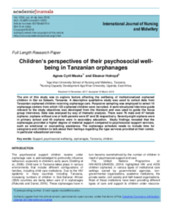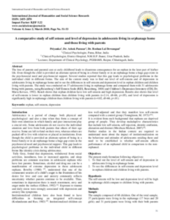Displaying 291 - 300 of 771
The objectives of the study were to describe and study the extent of depression in adolescent boys and girls living in institutional homes and to study the association between depression and externalizing and Internalizing behaviors among adolescents in institutional homes.
The study consisted of a comparative follow-up study with a pretest-posttest design which explored the association between baseline child, family, and care characteristics and the psychosocial development of 121 schoolaged Dutch children during their first year of placement in foster care (FC), family-style group care (FGC), and residential care (RC).
This talk, given by Dr Charles Nelson, focuses on two strands of work that reflect very different types of adversity: (1) the effects of early, profound psychosocial deprivation (including a review of the most recent findings from the Bucharest Early Intervention Project, a randomized controlled trial of foster care as an intervention for early institutionalization in Romania) and (2) the effects of growing up in a low resource urban center where children are exposed to a large number of both biological (e.g., malnutrition) and psychosocial (maltreatment) stressors (including a review of recent findings from a large study taking place in Dhaka, Bangladesh).
This review explored the conceptualization, operationalization and measurement of resilience in children and adolescents living in residential care settings.
El presente artículo busca describir brevemente las trayectorias de los adolescentes y jóvenes en su transición del sistema de cuidados alternativos a la vida adulta en América Latina.
This study investigated the relationship between congenital conditions and post-adoption mental disorder diagnosis and treatment in 235 female youth who were adopted from China about 15 years prior.
The aim of this study was to explore factors affecting the wellbeing of institutionalized orphaned children in Dar es Salaam, Tanzania.
This study aims to observe the effect of structured education provided to improve self-esteem and hope on the self-esteem and the suicide probability of male adolescents living in orphanages.
The aim of the current study was to find out level of self-esteem and of depression in adolescents living in orphanage home and to see the differences in self-esteem and depression level in orphan children and children living with parents.
This cross-sectional descriptive study explores the behavioral and emotional problems in institutionalized children in India.



